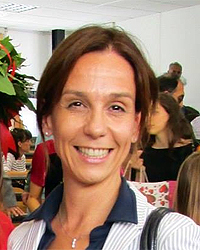Lucia Trevisi
 | Department of Pharmaceutical and Pharmacological Sciences, University of Padova Contacts |
Short CV
Born in Valencia (Venezuela)
Education:
1982 High School Diploma “Bachiller en Ciencias”, Valencia (Venezuela)
1989 Master Degree with full marks in Biological Sciences, University of Padova (Italy)
1990 Qualification for the profession of Biologist
1995 PhD in Environmental Medicine, University of Padova (Italy)
Grants and positions for research activity
1990-1991: Glaxo fellow, Dept of Pharmacology and Anesthesiology, University of Padova (Italy)
1992-1994: PhD fellow in Environmental Medicine, Dept of Pharmacology and Anesthesiology, University of Padova (Italy) (supervisor: Prof. Sisto Luciani).
1995-1998: Post-Doc, Dept of Pharmacology and Anesthesiology, University of Padova (Italy) 1998-1999: Graduate laboratory technician, Dept of Pharmacology and Anesthesiology, University of Padova (Italy)
1999-2002: Research fellow (assegno di ricerca), Dept of Pharmacology and Anesthesiology, University of Padova (Italy).
2002-present: Assistant Professor of Pharmacology (BIO/14)
Teaching
Office hours
please write an email for an appointment
Availability for Thesis Projects
Experimental Master’s Thesis on the following subjects: (1)mechanism of theanticancer effect of cardiac glycosides; (2) pharmacological regulation of angiogenesis.
Research
Scientific Activities
The current research of my laboratory mainly regards two different but interconnected topics in the field of cancer pharmacology:
1) Study of the anticancer effect of cardiac glycosides
Cardiac glycosides are well-known inhibitors of Na/K pump activity and some of them (digoxin, digitoxin) are still used to treat congestive heart failure and cardiac arrythmias. Binding of cardiac glycosides to Na/K-ATPase also initiate signaling cascades affecting cell survival, proliferation and differentiation. In this context, cardiac glycosides have the intriguing property of inducing cytotoxicity in cancer cells and antiapoptotic effects in normal cells. A potential anticancer effect of these drugs is supported by several epidemiological studies.
We study the molecular mechanism of the anticancer effect of cardiac glycosides with a special interest on the signaling pathways involved. Our research is conducted in several cancer cell lines as well as in normal cells in order to define the underlying mechanism of their selective cytotoxicity against tumor cells. We also study their effect on cells of tumor microenvironment, in particular endothelial cells that, through the formation of new vessels (angiogenesis), are a potential target of these drugs.
2) Pharmacological modulation of angiogenesis
Angiogenesis imbalance is present in numerous malignant disorders including cancer, contributing to tumor growth, invasion and metastasis. Thus, angiogenesis has become a therapeutic target for cancer treatment.
We study the effect of drugs on endothelial cells proliferation, migration and differentiation into capillary-like structures, three key events in the angiogenic process. In particular we investigate the effect of drugs on signaling proteins downstream multiple angiogenic stimuli (Akt, ERK, Src, FAK) in order to find new drugs that could overcome cancer resistance observed with first generation anti-VEGF therapy.
Editorial activity: reviewer for several peer-reviewed international journals.
Scientific memberships: member of the Italian Society of Pharmacology (SIF)
Technical expertise
Isolation and culture of human umbilical vein endothelial cells (HUVEC); in vitro tests of cell apoptosis/cell death, survival/proliferation; in vitro tests of cell migration and angiogenesis; flow cytometry (detection of reactive oxygen species, apoptosis/cell death, mitochondrial potential, cell cycle); immunocytochemistry; molecular biology (PCR, real-time RT-PCR, short-hairpin RNA transfection); western blotting (in particular signaling proteins involved in cell survival/proliferation and angiogenesis).
Publications
- Vara-Messler M, Pasqualini ME, Comba A, Silva R, Buccellati C, Trenti A, Trevisi L, Eynard AR, Sala A, Bolego C, Valentich MA. Increased dietary levels of α-linoleic acid inhibit mammary tumor growth and metastasis. Eur J Nutr. 2015; Nov 18 [Epub ahead of print].
- Gandin V, Trenti A, Porchia M, Tisato F, Giorgetti M, Zanusso I, Trevisi L, Marzano C. Homoleptic phosphino copper(I) complexes with in vitro and in vivo dual cytotoxic and anti-angiogenic activity. Metallomics. 2015; 7: 1497-1507.
- Di Francesco L, Dovizio M, Trenti A, Marcantoni E, Moore A, O Gaora P, McCarthy C, Tacconelli S, Bruno A, Alberti S, Gizzo S, Nardelli GB, Orso G, Belton O, Trevisi L, Dixon DA, Patrignani P. Dysregulated post-transcriptional control of COX-2 gene expression in gestational diabetic endothelial cells. Br J Pharmacol. 2015; 172: 4575–4587.
- Trenti A, Grumati P, Cusinato F, Orso G, Bonaldo P, Trevisi L. Cardiac glycoside ouabain induces autophagic cell death in non-small cell lung cancer cells via a JNK-dependent decrease of Bcl-2. Biochem Pharmaco. 2014; 89: 197-209.
- Trevisi L, Pighin I, Luciani S. Vascular endothelium as a target for endogenous ouabain: studies of the effect of ouabain on human endothelial cells. Cellular and Molecular Biology 2006; 52: 64-70.
Research projects and Funds
Progetto di Ateneo, University of Padova (2012-2014): “Copper(I) complexes as protein tyrosine phosphatase (PTP) inhibitors: a new approach to antimetastatic drug discovery” CPDA121973 (Participant).
Assegno di Ricerca, University of Padova (2012-2014): “Effect of cardiac glycosides on macrophage polarization and angiogenesis and its significance for anticancer therapy” CPDR129114/12 (PI).
Ex 60% projects, University of Padova





